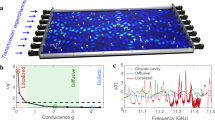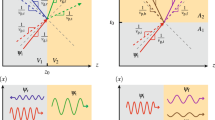Abstract
THE elastic scattering wave-function for a short-range potential function V(r) may be written in the form :  where j
l(x) and n
l(x) are the spherical Bessel and Neumann functions respectively, δl is the scattering phase-shift, and g
l(r) is a form factor measuring the distortion of the incident wave by the potential. g
l(r) must satisfy the boundary conditions
where j
l(x) and n
l(x) are the spherical Bessel and Neumann functions respectively, δl is the scattering phase-shift, and g
l(r) is a form factor measuring the distortion of the incident wave by the potential. g
l(r) must satisfy the boundary conditions 
This is a preview of subscription content, access via your institution
Access options
Subscribe to this journal
Receive 51 print issues and online access
$199.00 per year
only $3.90 per issue
Buy this article
- Purchase on Springer Link
- Instant access to full article PDF
Prices may be subject to local taxes which are calculated during checkout
Similar content being viewed by others
References
Mott, N. F., and Massey, H. S. W., “The Theory of Atomic Collisions”, second ed. (Oxford University Press, 1949).
Mather, K. B., and Swan, P., “Nuclear Scattering” (Cambridge University Press, 1958).
Blatt, J. M., Phys. Rev., 77, 647 (1948).
Author information
Authors and Affiliations
Rights and permissions
About this article
Cite this article
SWAN, P. Distorted Wave Approximation for Scattering Phase-Shifts. Nature 187, 585–586 (1960). https://doi.org/10.1038/187585a0
Issue Date:
DOI: https://doi.org/10.1038/187585a0
Comments
By submitting a comment you agree to abide by our Terms and Community Guidelines. If you find something abusive or that does not comply with our terms or guidelines please flag it as inappropriate.



